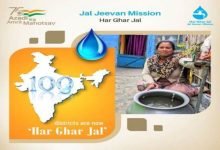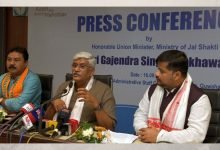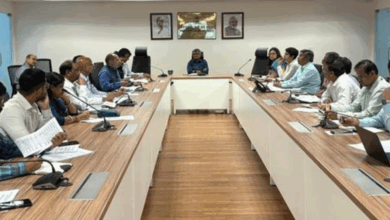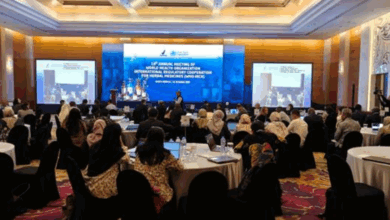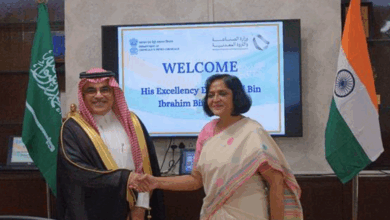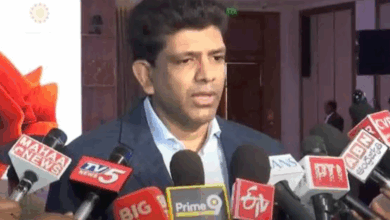National Jal Jeevan Mission Team Visits Jharkhand To Understand Ground Situation, Discuss Progress and Expedite Implementation OF The Mission
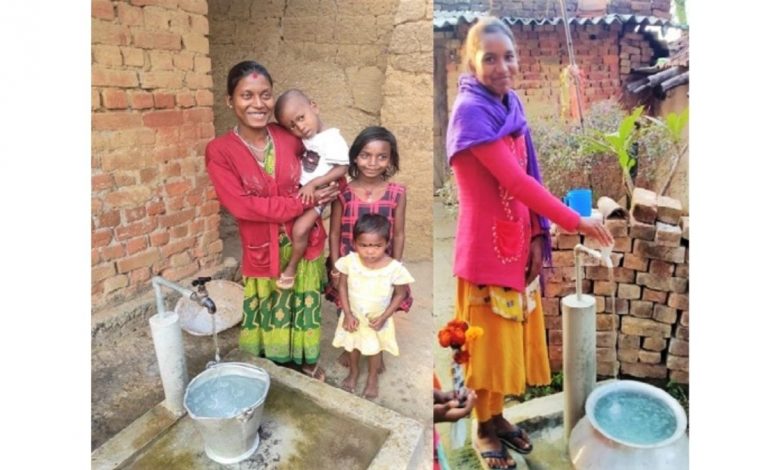
Jharkhand Plans To Become ‘Har Ghar Jal’ State By 2024
A multi-disciplinary team from the National Jal Jeevan Mission is on a visit to Jharkhand from 14th to 17th December 2021 in three districts of Ranchi, Seraikela Kharsawan and Purbhi Singham. During the visit, team members are visiting various villages. The visiting team will discuss various aspects of progress and implementation of the mission in the State, understanding the ground situation as well as discuss the saturation plan for 100% coverage of all households for making provision of tap water connections. They are interacting with district officials, local village communities, members of Gram Panchayats, etc. After the visit to districts, they will also interact with the State team to apprise about various aspects.
Jharkhand plans to make provision of tap water connections to all rural households by 2024, as well as schools, Anganwadi centres, ashram shalas and other public institutions by March 2022. About 3% of rural households in India are in Jharkhand but approx. 4.7% of remaining tap water connections in the country are to be provided in the State. Out of 59.23 lakh rural households, only 9.79 lakh (17%) households have the provision of a tap water supply. So far, the State has provided tap water connections to 2.39 lakh (24.5%) households out of 9.5 lakh planned in 2021-22.
In 2020-21, Rs 572.24 Crore Central grant was allocated to the State. To assist the State to provide a tap water supply to every household by 2024, Union Minister, Jal Shakti, Shri Gajendra Singh Shekhawat has increased the Central allocation four-folds to Rs 2,479.88 Crore. With this enhanced Central allocation, and the matching State share, Jharkhand has an assured availability of Rs 5,235.62 Crore under Jal Jeevan Mission for water supply works in 2021-22.
In addition to this, in 2021-22, Rs 750 Crore has been allocated to Jharkhand as the 15th Finance Commission tied grant for water & sanitation to Rural Local Bodies/ PRIs. There is assured funding of Rs 3,952 Crore for the next five years i.e. up to 2025-26.
Jal Jeevan Mission is implemented in a decentralized manner following the ‘bottom-up approach, wherein the local village community plays a key role starting from planning to implementation, management to operation and maintenance. To achieve this, the State Government has to undertake support activities like strengthening the Village Water &Sanitation Committee (VWSC)/ PaniSamiti, developing of Village Action Plan for each village for the next five years, engaging Implementing State Agencies (ISAs) to handhold and support village communities, carry out massive awareness among people. Jharkhand needs to train more than 2 lakh people in rural areas to ensure long-term sustainability and operation &maintenance of the water supply infrastructure for assured water supply to every home.
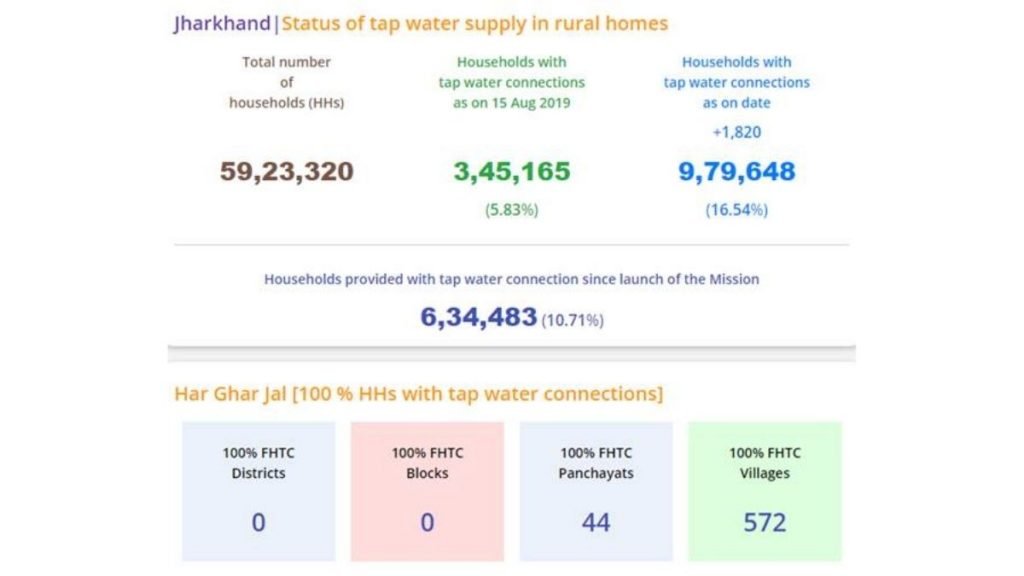
Under Jal Jeevan Mission, the community is being encouraged to carry out surveillance of water sources and delivery points from time to time to ascertain the quality of water supplied. PHE Department is training and facilitating the village communities to undertake regular water quality testing in their villages. In Jharkhand ‘Jal Sahiyas’ are playing an important role in water quality testing. They are trained by the Gram Panchayats. In Jharkhand, these ‘Jal Sahiyas’ are an important cadre of drinking water service delivery at the grassroots, often seen actively in engaged in activities related to the implementation of JJM.
With a focus on public health, potability of water supplied is given top priority, for which more than 2,000 water quality testing laboratories in the country have been opened to the general public so that people can get their water samples tested whenever they so desire at a nominal cost. Jharkhand has 30 water testing laboratories.
Announced by the Prime Minister on 15th August 2019, Jal Jeevan Mission is under implementation in partnership with States to make provision of tap water supply to every rural household of the country by 2024. The total budget for Jal Jeevan Mission in 2021-22 is Rs 50,011 Crore. With State’s own resources and Rs 26,940 Crore as the 15th Finance Commission tied grant for water and sanitation to RLBs/ PRIs, this year, more than Rs. 1 lakh Crore is being invested in the rural drinking water supply sector. Such huge investments in rural areas of the country boost the rural economy by generating employment opportunities in villages.
At the start of the mission in 2019, out of 18.93 Crore rural households in the country, only 3.23 Crore (17%) had a tap water supply. Despite challenges faced due to the COVID-19 pandemic and subsequent lockdowns, over 5.43 Crore (28%) households have been provided with a tap water supply since the launch of the mission. Presently, 8.67 Crore (45%) rural households receive potable water through taps. Goa, Telangana, Andaman & Nicobar Islands, Dadra & Nagar Haveli and Daman & Diu, Puducherry and Haryana have become ‘Har Ghar Jal’ State/ UT i.e. 100% of rural households have tap water supply in their homes.
Following the principle of the Prime Minister’s vision of ‘Sabka Saath, Sabka Vikas, SabkaVishwas, Sabka Prayas’, the motto of the mission is that ‘no one is left out and every rural household is provided with tap water connection. At present, every household in 83 Districts and more than 1.28 lakh villages are receiving a tap water supply.
Disclaimer : This is an official press release by PIB.

